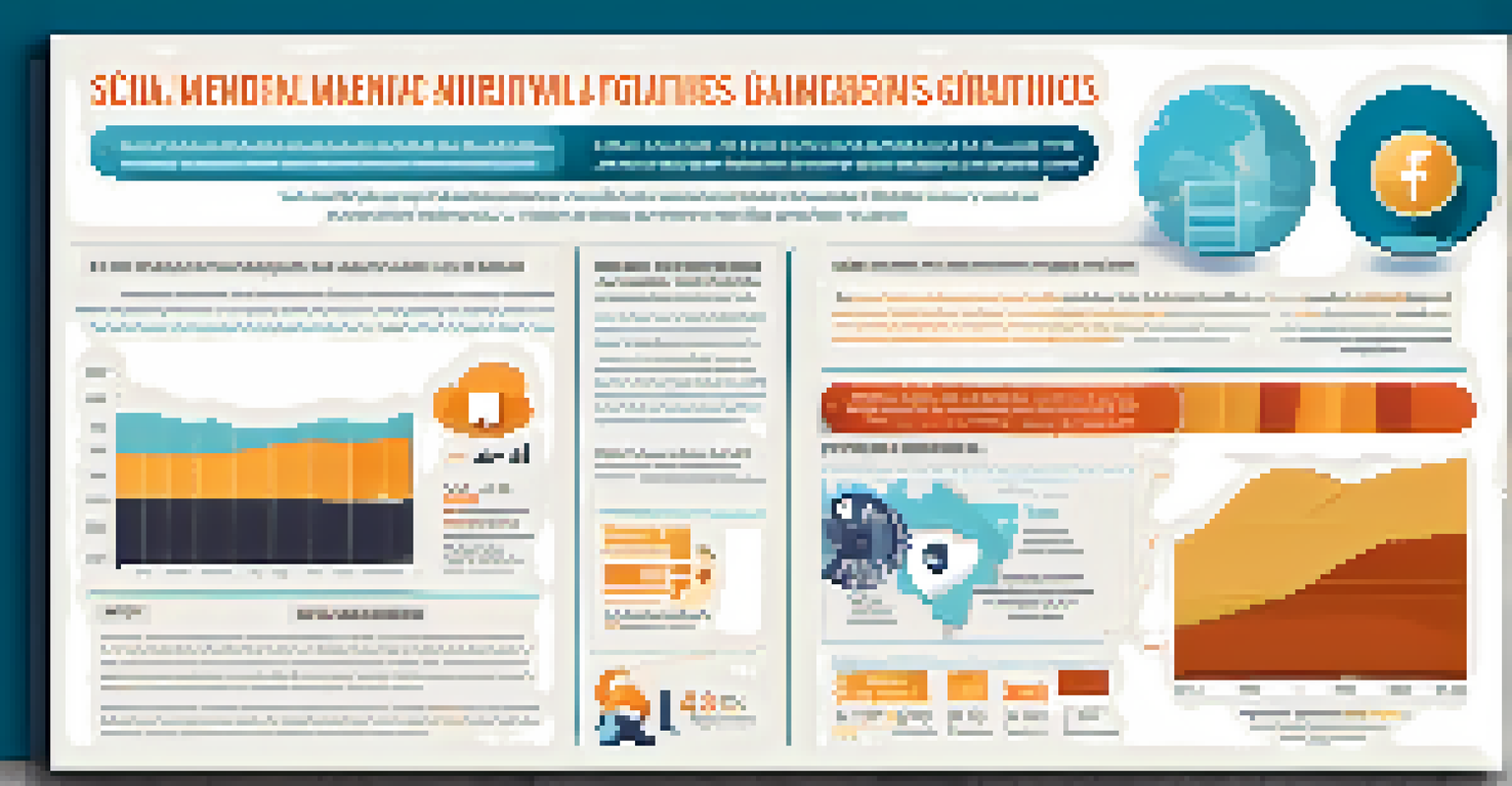Social Media's Role in Shaping Mental Health Policies

The Rise of Social Media in Mental Health Conversations
In recent years, social media has transformed the way we discuss mental health. Platforms like Twitter and Instagram have created spaces for open dialogue, helping to break the stigma surrounding mental health issues. People are sharing personal experiences, which fosters a sense of community and support that was often lacking in traditional discourse.
Social media is the ultimate equalizer. It gives a voice and a platform to anyone willing to engage.
For instance, campaigns like #MentalHealthAwareness and #EndTheStigma have gained traction, encouraging users to share their stories. This collective sharing not only raises awareness but also influences how mental health is perceived by the public and policymakers alike. Ultimately, social media acts as a catalyst for change by making mental health a topic of everyday conversation.
However, the impact isn't just in personal narratives; it extends to the policies that govern mental health services. As public sentiment shifts, policymakers are more likely to take notice and prioritize mental health initiatives, leading to more comprehensive and inclusive policies.
Influence of Online Communities on Mental Health Policies
Online communities have emerged as powerful advocates for mental health policy changes. Forums and support groups provide individuals with a platform to discuss their struggles and the inadequacies of existing mental health services. This grassroots level of engagement is crucial for highlighting specific needs that may otherwise go unnoticed by policymakers.

For example, Reddit threads often feature discussions about the lack of resources for certain demographics, such as LGBTQ+ individuals or minorities. These conversations can lead to organized efforts to push for more tailored mental health services, ensuring that policies are reflective of diverse community needs. Online communities offer a collective voice, making it difficult for authorities to ignore.
Social Media Breaks Mental Health Stigma
Platforms like Twitter and Instagram facilitate open dialogue about mental health, fostering community support and raising awareness.
By amplifying these voices, social media not only raises awareness but also empowers individuals to advocate for their own rights and needs. This dynamic can lead to significant policy shifts that prioritize inclusivity and accessibility in mental health care.
Social Media Campaigns Driving Policy Changes
Many successful social media campaigns have directly influenced mental health policies. Initiatives like #BellLetsTalk have raised millions for mental health programs while also sparking public discussions about mental health challenges. The visibility gained through such campaigns encourages lawmakers to consider the importance of mental health funding and resources.
The greatest weapon against stress is our ability to choose one thought over another.
These campaigns often leverage storytelling to humanize the statistics, making them relatable to a broader audience. When people see the human impact behind the numbers, it becomes harder for policymakers to ignore the urgent need for reform. This emotional connection can be a powerful motivator for change.
Moreover, the viral nature of social media allows these messages to reach a global audience, creating international pressure for policy improvements. As more people engage with these campaigns, they contribute to a larger movement that demands attention and action from those in power.
The Role of Influencers in Mental Health Advocacy
Influencers have become key players in shaping mental health discussions on social media. By sharing their own experiences and struggles, they provide relatable content that resonates with their audiences. This authenticity can inspire followers to seek help or engage in conversations about mental health, further normalizing these discussions.
For instance, when popular figures openly discuss their mental health challenges, it encourages fans to do the same. This ripple effect can lead to increased public awareness and a demand for better mental health resources. Influencers have the power to reach millions, making their advocacy efforts incredibly impactful.
Online Communities Influence Policies
Grassroots engagement through online forums highlights specific needs, urging policymakers to address diverse mental health service gaps.
Additionally, many influencers partner with mental health organizations to promote healthy practices and resources. These collaborations not only amplify the message but also lend credibility to the organizations, driving home the importance of mental health advocacy in policy formation.
Challenges of Misinformation on Social Media
While social media has many benefits for mental health advocacy, it also presents challenges, particularly regarding misinformation. False information can spread quickly, leading to harmful misconceptions about mental health. This can distort public understanding and complicate efforts to develop effective policies.
For example, misleading claims about mental health treatments can discourage individuals from seeking necessary care. When people encounter inaccurate portrayals of mental health disorders, it can perpetuate stigma and fear, making it harder for policymakers to address these issues effectively. The prevalence of misinformation can undermine the progress made by legitimate advocacy efforts.
To combat this challenge, it’s crucial for users to critically evaluate the sources of information they encounter online. Mental health organizations and experts need to actively participate in these conversations, providing accurate resources and guidelines that can help steer public discourse in a healthier direction.
Social Media Metrics and Their Impact on Policy Decisions
Social media metrics provide invaluable data that can inform mental health policy decisions. By analyzing trends in engagement, sentiment, and discussions, policymakers can gauge public interest and concern regarding mental health issues. This data-driven approach can help prioritize initiatives that align with community needs.
For example, if a particular mental health topic trends significantly on social media, it may indicate a growing public concern that policymakers should address. By leveraging this information, governments can allocate resources more effectively and develop programs that resonate with their constituents.
Campaigns Drive Change in Mental Health
Successful social media initiatives humanize mental health issues, compelling lawmakers to prioritize funding and resources.
Moreover, social media analytics can help organizations measure the effectiveness of their campaigns, providing insights that can refine future efforts. This cycle of feedback allows advocacy groups to continuously improve their strategies, ultimately leading to more impactful policy changes.
The Future of Mental Health Policies in the Digital Age
As social media continues to evolve, its role in shaping mental health policies will likely grow even more significant. The ongoing dialogue facilitated by these platforms is essential for keeping mental health at the forefront of public policy discussions. As more people engage in these conversations, the need for comprehensive mental health policies becomes increasingly clear.
Looking ahead, we can expect to see more collaboration between social media platforms and mental health organizations. By working together, they can create spaces for education and advocacy that inform users about mental health resources and policies. This partnership can pave the way for more informed and supportive environments.

Ultimately, the integration of social media into the mental health discourse can lead to a more compassionate and understanding society. As we harness the power of these platforms, we can create meaningful change that improves mental health outcomes for all.